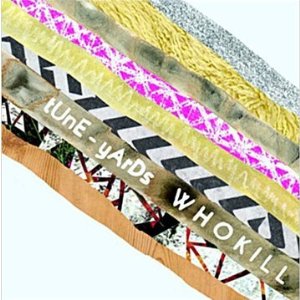OK, let me get this off my chest early: I’m making a stand. I hereby refuse to write the name of this band or album in the ridiculous manner in which they appear above ever again. It may not be my place to defy the way in which an artist chooses to present themselves, but all that messing about with spacing and the Caps Lock key seems like wanton abuse of the English language, and a lot more bother than it’s worth. Anyone that desperate to let people know how quirky they are might as well perform in a yellow rabbit-suit with a sign round their neck saying "I’m mad, me!", and to be honest Merrill Garbus – the woman behind the Tune-Yards (there, doesn’t that look better?) moniker – needs little more than her voice and her music to convince listeners of that.
If you’re the kind of person that can listen to a Bjork or Joanna Newsom song without feeling compelled to jam a fork into your ear, there’s a fair chance you’ll find something to enjoy about Tune-Yards’ second album Whokil. Garbus’ voice is as divisive as either of the aforementioned ladies – powerful and ferocious, flipping between jazzy scatting and soulful crooning like a female version of the Dirty Projectors’ Dave Longstreth – but it is just one component of an extensive, eccentric avant-pop collage of sounds that also includes ukulele, glockenspiel and saxophone, and beats (both organic and electronic) influenced by hip-hop, R&B, dub and African street music.
This kitchen-sink approach could end up sounding pretty messy, so it’s to Garbus’ credit that Whokill is so coherent. Opener ‘My Country’ is a perfect example; the singer alternately bellowing and cooing over a thumping beat and a bed of chopped-up vocal samples, swelling synths and brassy fanfares that show what wonders a helping hand – from new bassist and occasional co-writer Nate Brenner and engineer Eli Crews – and an increased production budget (2009 debut Bird-Brains was self-recorded on a laptop) can do.
It takes more than decent microphones to make great pop music though, and Garbus’ song-writing has come on in leaps and bounds. Whokill sees her drawing inspiration from far and wide; ‘Es-so’ and ‘Gangsta’ combine scratchy No-Wave guitars and free-jazz sax skronk, while a number of tracks (‘Bizness’, ‘Riotriot’, ‘You, Yes You’) have a distinctly African flavour, albeit one that owes as much to the sample-heavy experiments of Byrne and Eno and Vampire Weekend’s ethno-tourism as it does to authentic high-life and Afrobeat. But for all Garbus’ Riot-Grrrl posturing, the album’s best moments are its most mellow: the spaced out, slow-motion ska of ‘Powa’ is almost overwhelmingly soulful, whilst doo-wop protest song ‘Doorstep’ sounds like some lost girl-group classic recorded in King Tubby’s echo chamber.
Unfortunately, Garbus stumbles slightly at the final hurdle: the penultimate ‘Wooly Wooly Gong’ is an ill-advised attempt at a lullabye that overstays its welcome by about two minutes, derailing the album’s momentum, whilst closer ‘Killa’ seems unable to find its groove, bringing proceedings to a close with a whimper rather than a bang. Even diamonds have flaws though, and there’s no denying that in Whokill Tune-Yards have produced a real gem. Garbus may not be everybody’s idea of a pop star, but the doubters should probably start getting used to her: this joyous, adventurous album is going to be hard to ignore when the year-end lists start rolling in.


